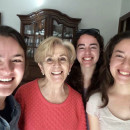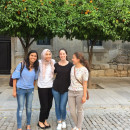Granada will steal a place in your heart Past Review
By Lina Purtscher (Scripps College) - abroad from 01/31/2017 to 05/26/2017 with
IES Abroad: Granada - Study Abroad with IES Abroad
My goals when going abroad were to really improve my Spanish fluency and confidence. This is something I definitely accomplished, even if I wasn’t speaking Spanish with my program friends. I also wanted to learn more about the Spanish people and culture. There’s no doubt that I was able to learn a lot, but what I didn’t anticipate was the way it would profoundly affect me. I was just learning about the culture, I was living it; I wasn’t simply learning about the Spanish people, I was talking with them and becoming friends with them. Though I wasn’t always surrounded by just Spaniards, the extent to which I felt that I was settled and that I had adapted to the Spanish way of life took me completely by surprise. Before leaving, I had yearned for something different that the never-ending amounts of school work that didn’t make me feel satisfied with my life. Abroad, I found a way of life that to me seemed to focus so much more on just “living”: on living the good life, and truly having the time to connect with those most dear to you. Besides that, I soon came to find the challenges of living and traveling abroad, of having new experiences, of meeting new people, and of speaking a foreign language to be truly satisfying for me. In these ways, I came back with so much more than I set out to accomplish. Cheesy as it sounds, the new perspectives and insights I’ve gained are incredibly precious to me, and I strive to draw on them going forward. My experience abroad deeply and personally affected me, and going forward I strive to continue to shape my life with what I have gained from my experience.
Review Photos





Personal Information
| How much international exposure did you have prior to this program? | 0-2 weeks |
Review Your Program
|
* Overall educational experience
Academic rigor, intensity, resources, etc. |
The workload is significantly lighter. As an English major, instead of reading the usual novels, for class we only read poems and short plays. The amount of homework in general is very, very manageable. But in Spain you will find you spend a lot more time “living” – walking from place to place, eating long lunches at home, taking siesta, and going out for hours for tapas. You have to be strategic about using the in-between times to get your homework out of the way. But many of my classes were built around class excursions and trips, and this was incredible. You get to know about the city around you in ways you never could by yourself, and to understand more about Spanish people and modern culture. Of course, not all my classes were as intellectually challenging as my home college, nor were all my professors the best or most memorable I’ve had. Sometimes the work assigned feels more like busy work. I had one class that certainly was amazing, with a professor I won’t soon forget. But overall I feel like I got what I was looking for academically in my time abroad: less work, but classes that were different, some outside my comfort zone, and that opened my eyes to new things. |
|
* Host Country Program Administration
On-site administration of your program |
I'd say that one of the strengths of the program is the incredible support. The IES staff members are easy to talk with, and easy to get in contact with as well -- I was able to text with the program director even over Spring Break! Javier, the director, is such an amazing person: enthusiastic, well-educated, and a people person. He's spent a lot of time in the U.S. as well, so he really understands student perspectives and problems. Orientation was pretty long, at least 10 days, if not 2 weeks. It was a good time to get settled, to start making your way through the city, and to wade into Spanish culture. It starts and ends with excursions to other Andalucian cities, and it’s easy to make friends on these trips. You also have orientation classes and introductory Spanish courses. It does start to feel a bit long near the end. The only info session that I found lacking was the Diversity orientation – I think it’s hard to really describe the way Spaniards see other races and ethnicities. It’s quite different to American thinking, and in general I don’t think it was well articulated or discussed. I'm so grateful that IES arranged intercambios for us -- it was a really special experience. I enjoyed meeting with my intercambio (language buddy) arranged by the program. We would speak in both Spanish and English, and I was able to learn a lot more about youth culture that way (he was a university student). We usually met in cafes. The program also had local university student "orient adores," who would hang out around the IES center and lead day-trips and outings around the city. Go on the trips led by the orientadores! I regret not going on more. |
|
* Housing:
How satisfied were you with your living arrangements? |
I stayed with a host family in the city. Like many students, I had just a host mom (Juana). I also had a roommate, which was also normal for the program. However, my roommate and I shared a room, while most others had separate rooms. The space was large and adequate, though. Juana provided us with breakfast (fruit, coffee/tea, pastries, toast), and a large and delicious lunch each day. Dinner was on our own, though my home college provided a meal allowance for this. Tapas are easy to find and very affordable. (Because they're free... with a drink!) I very much enjoyed spending time with my host mom, Juana. She was very talkative, and I learned a lot from her. I also got a few colds over the semester, and she was very helpful – went to the clinic for the first time with me, and gave me tea and advice. As with most Spanish mothers, she refuses to let you help with the chores. She tidied our rooms, and also did our laundry each week, which I was always very grateful for. The only drawback I guess was having to share a room, though there was an extra office space we could use for phone calls and homework. I found that living in a homestay was the best of both worlds – I got learn from and interact with a local, had some meals and services provided, and since I had only a host mom, I never felt like I had to modify my behavior at home in respect for an entire family. There were few rules, and no real curfew, though Juana did prefer to know if we were planning on staying out late a certain evening. The walk to campus from our apartment was probably about 20-25 minutes one-way. I didn’t chose to use the city buses to get to campus, though a few students who lived farther out did (round trip, maybe 3 euro?). I know many other students lived closer and had a shorter walk, though. If there was a minor emergency, a taxi would probably only cost 4 to 6 euro. I very much enjoyed my walks to campus though – walking is a big part of life in Spain, and there is so much to see. I got really fit over the course of the semester! |
| * Food: |
Oh my goodness, I miss the Spanish food so much! There's nothing like a long, extended, delicious Spanish lunch made by your host mom, and a siesta to follow, of course. Tapas for dinner are easy to find and very affordable. (Because they're free... with a drink!) In the evenings, everyone goes out to meet with friends and grab a drink and tapas. The drinking culture for the most part is healthy as well – people don’t drink to get drunk, which was a perspective-altering change for me coming from campus culture. I always felt so connected to my friends when out for tapas – you get to explore new places together, while having such great conversation. We would hardly check our phones for hours – there was no place we’d rather be, and no one we’d rather be with. |
|
* Social & Cultural Integration:
How integrated did you feel with the local culture? |
It’s in no way difficult to adjust to the Spanish lifestyle, but making Spanish friends is definitely harder. The most interaction I definitely had was with my host mother, Juana. I was able to learn a lot about Spanish culture, sayings, etc. from her, and I really enjoyed spending time with her during lunch, or watching a television series with her. I also enjoyed meeting with my intercambio (language buddy) arranged by the program. We would speak in both Spanish and English, and I was able to learn a lot more about youth culture that way (he was a university student). We usually met in cafes. I'm so grateful that IES arranged intercambios for us -- it was a really special experience. The program also had local university student "orient adores," who would hang out around the IES center and lead day-trips and outings around the city. Go on the trips led by the orientadores! I regret not going on more. Also, I know students who joined outside activities, like pick-up soccer, were able to meet a lot more local students. Spend time with your host family, and make a concerted effort to join them in the activities they enjoy. Also, don’t hesitate to meet the intercambios of your friends in the program! Though I wasn’t always surrounded by just Spaniards, the extent to which I felt that I was settled and that I had adapted to the Spanish way of life took me completely by surprise. |
|
* Health Care:
How well were health issues addressed during the program? |
I had several bad colds as well as allergies while abroad. I didn’t have too much trouble getting medical attention. There are farmacias (pharmacies) on almost every street, many that are open late, and at least one that is open 24/7. Be aware though that they are not like our CVS and Walgreens; instead of finding what you want and checking out, you need to go up to the counter, describe your symptoms, and ask for what you need. The pharmacists are very helpful, though, and it’s a great way to practice your Spanish! If you need to see a doctor, the program has a walk-in clinic they recommend. I was grateful that my host mom took me the first time, though it’s pretty straightforward. You need to bring your passport and 40 euro. You wait your turn, but it shouldn’t be too long. Make sure to ask for all receipts. You can easily bring your prescriptions to a farmacia and get it filled on the spot – ask for receipts there, too. |
| * Safety: |
In general, Granada is an exceedingly safe place. The streets feel safe at night, though do your best to walk with friends and stick to main streets where people are still out. This is something I really miss about Granada -- there's nowhere where I've ever felt safer while out at night. As for crime, there was just the one student I knew who had her phone stolen by a pickpocket in one of the most touristy place in Granada, the Mirador de San Nicolas. In general I wouldn’t say that pickpockets are a big worry, but if you are in an extremely crowded and touristy area of the city (like the Alhambra), keep your belongings close to you. The people of Granada exercise their right to protest/demonstrate on a regular basis, and sometimes streets will be blocked for pedestrian traffic only. They are never unruly or violent, however. Most demonstrations are smaller. IES has an online location tracker for you to fill out with details whenever you travel outside of Granada -- in case anything were to happen, they want to know where you are and if you are safe. There is also a text alert and phone call system in place. |
| If you could do it all over again would you choose the same program? |
Yes
There’s no way I can recommend it highly enough! |
Finances
|
* Money: How easily were you able to live on a student's budget?
(1 = not very easy/$200+ on food & personal expenses/week, 2.5 = $100/week, 5 = very easily/minimal cost) |
Granada is the cheapest city in Spain! This felt like a continual gift the whole time I was there. Grabbing tapas or popping into a cafe is particularly cheap (maybe 2-5 euro), so it's easy to go out with friends and not have to worry about spending too much money. I and almost everyone I know simply withdrew euros from the ATM. As always, it’s recommended to withdraw large amounts at once so that the small ATM fee doesn’t end up accumulating with too many withdrawals. I had a debit card while abroad, and I don’t think I was always charged for a withdrawal fee. Though you can usually find a way to pay with debit/credit card at restaurants and larger shops abroad, Spain is extremely cash heavy, and people rarely use their cards. I recommend to always have a lot of cash on you, and to have something that can function as a coin purse as well, as you will accumulate lots of euro coins. It’s certainly an adjustment, but I now miss paying mostly in cash and coins! It’s also a lot easier to keep track of what you’re spending (if you really need to) when you’re using cash. I spent a lot less on supplies than I normally would in a semester. As far as program expenses go, all IES-led trips are included in the price of the program, except for a 4 day trip to Morocco for about $400. I went, and I can safely say that it was a priceless experience! |
| Do you have any general money-saving tips for future study abroad participants? | Across the board, Spain is much more affordable than the U.S., and Granada is the cheapest city in Spain! I’m not sure there was anything that was noticeably more expensive in Spain, though of course there are high-end clothing stores you can shop at. Also, the major department store, El Corte Ingles, is not cheap at all. You can always find clothes, electronic stuff, groceries, etc., at cheaper stores. For clothing, there are multiple Zaras (Spanish-owned!) and an H&M, as well as many others, like Lefty’s, and Sfera. There are endless shoe stores, and you can find something for all price ranges (be conscious of quality, though). Mercadona or Super Sol are good for extra snacks and groceries, though there will be a wider range at Mercadona. Panaderias and pastelerias abound, and you can always get something to go (some places have to-go coffee, like Casita del Pan). There are also fruterias for fresh fruit and produce. The best store ever, Tiger (Danish brand), has all sorts of knick-knacks, art and school supplies, some electronic cords, etc., and snacks for very cheap! |
Language
| * Did your program have a foreign language component? | Yes |
|
How much did the program encourage you to use the language?
0 = No encouragement, 5 = frequent encouragement to use the language |
All my classes were in Spanish, and I always spoke with my host mom in Spanish. I usually spoke with my roommate and fellow American students in English, though. With my intercambio, I spoke both. You will stand out as an American, of course. People in stores or restaurants might speak to you in English, even if you talk to them in Spanish (not all them time, of course). Be stubborn and keep on with your Spanish! I was essentially fluent before I arrived, but my time abroad helped me gain so much more confidence in my abilities, and improved my vocabulary as well! Simply put, speaking Spanish with others is much, much easier in a Spanish-speaking country. You will learn a lot from your host family as well – make the effort to have conversations with them outside of just meal times. And truly take advantage of having intercambios to speak with as well! Again, don’t hesitate to meet the intercambios of your program friends, as well. We were not instructed in the vosotros form, though, so brush up on that before you arrive. |
| How would you rate your language skills at the beginning of the program? | Advanced |
| How would you rate your language skills at the end of the program? | Fluent |
Other Program Information
|
* Where did you live?
Select all that apply |
|
|
* Who did you live with?
Select all that apply |
|
|
* Who did you take classes with?
Select all that apply |
|
| About how many local friends did you make that you will likely keep in touch with? |
A Look Back
| * What did you like most about the program? |
|
| * What could be improved? |
|
| * What do you know now that you wish you knew before going on this program? | That Granada has so many different wonderful neighborhoods to explore, and plazas and surprises to discover around every bend. Also, that there is an extensive network of trails behind the Alhambra, so nature is never that far away. |
Reasons For Studying Abroad
| To help future students find programs attended by like-minded individuals, please choose the profile that most closely represents you. |
The Outright UrbaniteA social butterfly, you're happiest in bustling cities with hip people, and took advantage of all it had to offer. You enjoyed the nightlife, and had fun going out dancing, and socializing with friends. Fun-loving and dressed to the nines, you enjoyed discovering new restaurants, shops, cafes, and bars in your host country. |








